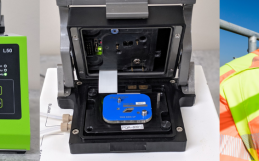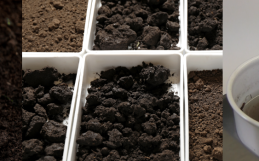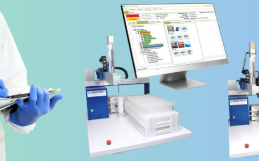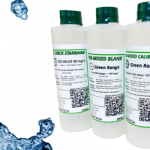MANTECH is a leading innovator of water, soil, and food analysis generating the highest quality result, in the shortest amount of time using green methods. With simple, smart analyzers MANTECH has introduced rapid alkalinity testing (RapidAlk™) reducing total analysis time to under 4 minutes with the use of smaller samples, testing alkalinity in the fastest, greenest way possible.
What is Alkalinity?
Alkalinity is a common water analysis parameter described as the capability of water to neutralize acid, also known as an expression of buffering capacity. Hydroxides (OH–), carbonates (CO32-), and bicarbonates (HCO3–) are the primary contributors to the pH buffering capacity of a solution. Buffering capacity can be characterized by the absorption of positively charged hydrogen ions by negatively charged HCO3– and CO32- molecules. A buffer absorbs excess H+ ions and protects the water body from fluctuations in pH. Alkalinity analysis is often used as an indicator of biological activity and a common tool in monitoring drinking water, wastewater, surface water, swimming pools, and more. Total alkalinity can be calculated by titration, the process that measures alkalinity and is noted as the sum of the concentrations of OH–CO32-, and HCO3– in a solution, and expressed as mg of CaCO3/L.
MANTECH Rapid Alkalinity
MANTECH recognizes the high value of alkalinity testing and specializes in automated speciated rapid alkalinity testing (RapidAlk™) using as small as 10mL of sample. The total analysis time is under 4 minutes through our sustainable low volume testing, including automated pipetting using MANTECH’s Titrasip™, analysis, and rinsing. MANTECH systems conform to EPA, ASTM, ISO, and Standard Methods to test alkalinity in the fastest, greenest way possible. With a lower sample volume and less analysis time needed, precise, faster, and more accurate results are delivered. MANTECH MT-Series Automated Titration Systems have improved operational efficiency at thousands of environmental testing laboratories by providing configurations that meet requirements and exceed expectations.
Importance of Alkalinity in Drinking Water
The testing of alkalinity in water is critical to providing safe, clean drinking water as alkalinity levels directly influence treatment efficiency at Drinking Water Treatment Plants. Drinking water with high levels of alkalinity can lead to higher pH levels, negatively affecting micronutrients like manganese and iron, resulting in deficiencies. On the other hand, low alkalinity levels lack necessary elements that will be able to neutralize acid, leading to a decrease in pH levels causing deficiencies in calcium, sulfate, and magnesium. Alkalinity testing is vital to ensuring all treatment processes run as designed and clean, safe drinking water is delivered.
Testing Alkalinity in Wastewater Treatment
Alkalinity testing is not only essential for drinking water but for wastewater plants as well. Wastewater treatment plants use physical, chemical, and biological processes to implement treatment plans that comply with regulations. Accurate measurements of alkalinity are required as some treatment plants use additional alkalinity for pH control, while also being a crucial aspect of the effluent water quality outflow. Measurement of alkalinity within a wastewater treatment plant improves plant process efficiency and prevents issues that can arise from poor measurement.
Watch Small Volume pH Analysis
Interested in Precise, Faster, and more Accurate Alkalinity Testing?
Fill out the form to get in-touch with our team for more information and quotations for RapidAlk™.







